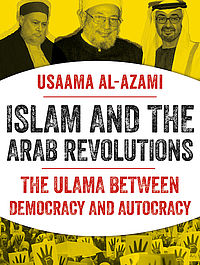Islam and the Arab Revolutions — The Ulama Between Democracy and Autocracy
Book Presentation with Usaama al-Azami
The Arab revolutions of 2011 were a transformative moment in the modern history of the Middle East, as people rose up against long-standing autocrats throughout the region to call for ‘bread, freedom and dignity’. With the passage of time, results have been decidedly mixed, with tentative success stories like Tunisia contrasting with the emergence of even more repressive dictatorships in places like Egypt, with the backing of several Gulf states.
Focusing primarily on Egypt, this book considers a relatively understudied dimension of these revolutions: the role of prominent religious scholars. While pro-revolutionary ulama have justified activism against authoritarian regimes, counter-revolutionary scholars have provided religious backing for repression, and in some cases the mass murder of unarmed protestors.
Usaama al-Azami traces the public engagements and religious pronouncements of several prominent ulama in the region, including Yusuf al-Qaradawi, Ali Gomaa and Abdallah bin Bayyah, to explore their role in either championing the Arab revolutions or supporting their repression. He concludes that while a minority of noted scholars have enthusiastically endorsed the counter-revolutions, their approach is attributable less to premodern theology and more to their distinctly modern commitment to the authoritarian state.
Author
Usaama al-Azami is Departmental Lecturer in Contemporary Islamic Studies at the University of Oxford. He completed his BA in Arabic and Islamic Studies at Oxford, his seminary training at Al-Salam Institute, and his MA and PhD in Near Eastern Studies at Princeton University. He specialises in Islamic political thought.
Moderation: Besnik Sinani
This event is part of the lecture series:
Book Presentation Series 2022
New Releases at ZMO

Details
Online